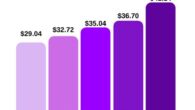Are you considering a career as an insurance agent? If so, one of the first questions you may have is about the potential income you can earn in this field. In this blog post, we will explore the various factors that impact insurance agent salaries and discuss the potential earning possibilities for those in this profession.
From understanding the average insurance agent salary to exploring the commission structure and sales skills needed for success, we will cover all the key aspects that play a role in determining how much you can make as an insurance agent. Additionally, we will look at specialized niches, value-added services, and client retention strategies that can help boost your income.
Whether you’re just starting out or looking to advance in your insurance career, understanding the earning potential and global trends in insurance agent salaries can provide valuable insights. So, let’s dive in and uncover the world of insurance agent salaries and the various factors that come into play when it comes to selling policies and making a living in this industry.
Table of Contents
Average insurance agent salary: How much can you make?
As an insurance agent, your salary can vary depending on several factors such as your location, experience, and the type of insurance products you sell.
According to the Bureau of Labor Statistics, the average insurance agent salary in the United States is $50,600 per year, with the top 10% earning more than $125,000 annually. However, it’s important to note that these figures can fluctuate based on the specific insurance industry you work in.
Agents who work in health and medical insurance typically have higher earning potential compared to those in auto or property insurance. Additionally, those with years of experience and a proven track record of sales success often command higher salaries and bonuses.
So, if you’re considering a career as an insurance agent, it’s essential to research the average salary in your area and the earning potential for the specific insurance products you intend to sell. By understanding these key factors impacting insurance agent salaries, you can make an informed decision about your earning potential in this industry.
Factors impacting insurance agent salaries: Understanding the variables
When it comes to understanding the variables that impact insurance agent salaries, there are several factors that come into play. One of the most significant factors is the level of experience an agent has in the industry. More experienced agents tend to have higher salaries, as they have built a larger client base and have a better understanding of the market.
Additionally, the location of an insurance agent can greatly impact their salary. Agents in urban areas tend to make more money than those in rural areas, as there is often a higher demand for insurance in cities.
Another important variable to consider is the type of insurance an agent specializes in. Some types of insurance, such as health or life insurance, can be more lucrative than others, such as auto or property insurance. Agents who specialize in high-demand, high-value insurance policies often have the potential to earn higher salaries.
Lastly, the commission structure of an insurance agency can also impact an agent’s salary. Some agencies offer higher commission rates for policy sales, while others may have a lower base salary but higher bonuses and incentives. Understanding the commission structure is crucial in determining an agent’s potential income.
Commission structure: How agents earn from policy sales
Insurance agents can earn their income through various commission structures based on policy sales. One common method is the straight commission where agents earn a set percentage of the premiums from the policies they sell. This incentivizes agents to sell more policies as their income directly correlates with their sales performance.
Another commission structure is the salary plus commission model, where agents receive a base salary in addition to a commission on their policy sales. This provides a more stable income while still offering the potential for higher earnings through commission. Some insurance companies also offer bonuses or incentives for meeting certain sales targets, further motivating agents to increase their sales productivity.
Some agents may also have the opportunity to earn residual commissions, which are ongoing commissions from policies that continue to generate premiums. This provides a source of passive income for agents as long as the policies remain active and in-force. Additionally, some insurance companies may offer overrides to agents who recruit and train new agents, giving them a share of the new recruits’ commissions.
It’s important for insurance agents to understand the commission structures available to them and how they can maximize their earnings through their sales efforts. By leveraging these different commission models, agents can potentially increase their income and achieve greater financial success in the insurance industry.
Insurance agent income potential: Exploring the earning possibilities
When considering a career in insurance sales, it’s important to understand the income potential that comes with the job. Insurance agents have the opportunity to earn a lucrative income, but the amount they make can vary depending on a number of factors.
One of the key factors that impacts an insurance agent’s income potential is their sales skills and success. Agents who excel at selling policies and meeting sales targets are more likely to earn higher commissions and bonuses, leading to a higher overall income.
Another important consideration is the commission structure of the insurance company an agent works for. Different companies offer different commission rates and structures, which can significantly impact an agent’s earning potential.
Agents can also explore specializations and niches within the insurance industry to find lucrative policy types that can boost their income. By focusing on specific types of insurance, such as life insurance or commercial insurance, agents can target higher-paying clients and increase their earnings.
Sales skills and success: Key factors for maximizing income
As an insurance agent, having strong sales skills is essential for maximizing your income potential. Being able to effectively communicate the value of insurance policies to potential clients and close sales is a crucial aspect of the job. Developing and honing your sales skills can significantly impact your earning potential.
One key factor for maximizing income as an agent is the ability to build successful relationships with clients. Building trust and rapport with clients can lead to repeat business and referrals, ultimately increasing your sales and income. Understanding the specific needs and concerns of each client and being able to provide tailored solutions is a key aspect of building successful client relationships.
Another important factor for income maximization is having a deep understanding of the insurance products you are selling. Being well-versed in the details of various insurance policies and being able to effectively communicate the benefits to potential clients can greatly impact your sales success. Continuously educating yourself on the latest industry trends and policy offerings can give you a competitive edge in the market.
Lastly, perseverance and resilience are crucial factors in maximizing income as an insurance agent. Rejection and setbacks are an inevitable part of the sales process, but maintaining a positive attitude and staying motivated can help you push through challenges and ultimately achieve success. Being persistent in pursuing sales opportunities and learning from each experience can contribute to long-term income growth.
Specializations and niches: Finding lucrative policy types
When it comes to working as an insurance agent, finding lucrative policy types can significantly impact your earning potential. By specializing in specific niches within the industry, agents can tap into underserved markets and provide unique solutions to clients’ needs, ultimately driving higher sales and commissions.
One way to find lucrative policy types is to conduct market research and identify areas of high demand with low competition. For example, by specializing in niche fields such as cyber insurance, drone insurance, or event cancellation insurance, agents can cater to clients with specialized needs and offer valuable coverage that may not be readily available from larger providers.
Furthermore, specialized knowledge and expertise in a particular area can lead to higher client trust and satisfaction, as clients will perceive the agent as an expert in their specific insurance needs. This can result in increased client retention and referrals, further boosting the agent’s income potential.
By focusing on specializations and niches, insurance agents can differentiate themselves in a crowded market, capitalize on unique opportunities, and ultimately maximize their income potential through niche policy types.
Value-added services: Boosting income through additional offerings
As an insurance agent, there are various ways to boost your income beyond just selling policies. One effective method is by offering value-added services to your clients. These additional offerings not only provide more comprehensive coverage for your clients, but also create opportunities for additional income streams.
One example of a value-added service is offering risk assessment consultations to clients. By assessing their risks and providing personalized recommendations, you can add value to their insurance package and potentially upsell them on additional coverage options.
Another way to boost income through additional offerings is by providing loss control services. This can involve conducting safety inspections for businesses, providing training on risk management, or implementing safety protocols. By reducing the risk of claims, you can help clients save on premiums and earn additional income through consulting fees.
By incorporating value-added services into your offerings, you can differentiate yourself from other insurance agents and create more opportunities for income growth.
Client retention strategies: Securing long-term income sources
Client retention is a critical aspect of an insurance agent’s success, as it is essential for securing long-term income sources. By focusing on retaining existing clients, agents can build a stable foundation for their income and minimize the need for constantly seeking new clients.
One of the key strategies for client retention is to provide exceptional customer service. Building strong relationships with clients by being responsive, knowledgeable, and reliable can significantly increase the likelihood of retaining them for the long term.
Another strategy is to regularly review and assess the coverage and services provided to clients. By proactively identifying opportunities for improvement or additional coverage, agents can demonstrate their commitment to meeting the evolving needs of their clients, thereby enhancing client loyalty and retention.
Furthermore, offering value-added services, such as annual policy reviews, personalized risk assessments, and educational resources, can demonstrate an agent’s dedication to ongoing client support and contribute to building long-term relationships that result in sustained income sources.
Career advancement prospects: Climbing the salary ladder
When it comes to career advancement prospects in the insurance industry, the potential for climbing the salary ladder is significant. As an insurance agent gains experience and expertise in the field, there are various opportunities for professional growth that can lead to substantial increases in income.
One of the key factors in career advancement prospects for insurance agents is the attainment of higher education and professional certifications. Many agents choose to pursue advanced degrees in business or finance, as well as industry-specific designations such as Chartered Property and Casualty Underwriter (CPCU) or Certified Insurance Counselor (CIC). These additional qualifications not only enhance an agent’s knowledge and skills, but also make them more valuable to employers and clients, thus opening the door to higher-paying positions.
Furthermore, climbing the salary ladder as an insurance agent often involves taking on leadership roles within a brokerage or agency. Agents who demonstrate strong sales performance, client retention, and team management may be promoted to positions such as sales manager, branch manager, or agency principal. These leadership roles typically come with increased responsibilities and higher compensation, making them desirable for ambitious professionals.
Finally, the career advancement prospects for insurance agents also extend to entrepreneurial pursuits. Many agents choose to start their own agencies or brokerages, either as independent operators or as franchisees of established brands. By building a successful business, agents can create substantial wealth for themselves and their employees, while also enjoying the autonomy and flexibility that comes with ownership.
Insurance agent salaries worldwide: Comparing global trends
When it comes to insurance agent salaries, there can be significant variations based on geographical location. Global trends in insurance agent salaries can be influenced by a variety of factors, including the cost of living, local demand for insurance, and the regulatory environment. It’s important for insurance agents to understand how their income potential compares to their counterparts around the world.
One key factor impacting insurance agent salaries worldwide is the cost of living in different countries. Agents working in cities and countries with higher costs of living generally command higher salaries to keep up with expenses. Conversely, those working in areas with lower costs of living may earn less despite a comparable workload. This dynamic can create significant disparities in insurance agent salaries from one region to another.
Another significant variable impacting global insurance agent salaries is the local demand for insurance. In areas with high demand, such as rapidly developing economies or regions susceptible to natural disasters, insurance agents may earn higher salaries due to increased sales opportunities and commissions. In contrast, areas with lower demand for insurance may offer fewer earning opportunities for agents.
The regulatory environment can also play a crucial role in shaping international insurance agent salaries. In some countries, there may be strict regulations on insurance sales and commissions, limiting the earning potential for agents. However, in other regions with more relaxed regulations, agents may have the opportunity to earn higher commissions and bonuses, leading to substantially higher salaries.






